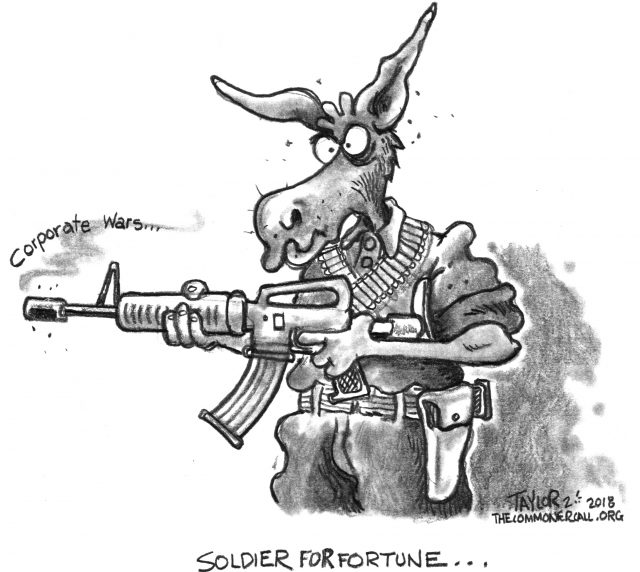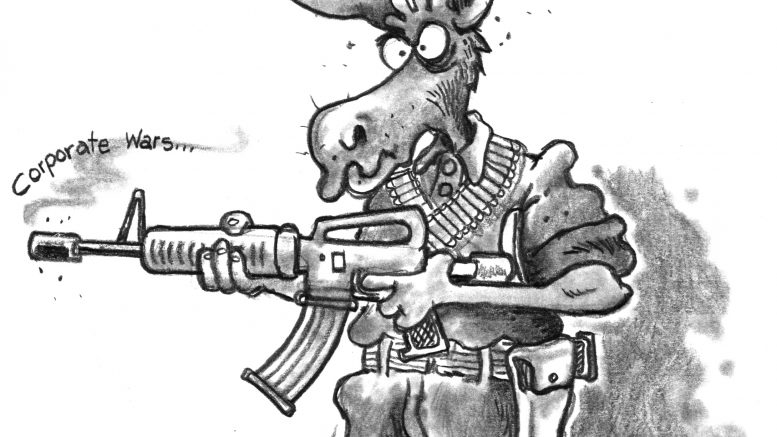
By Adam Johnson
In These Times (2/22/18)
In the aftermath of the shooting in Parkland, Fla., that left 17 dead, many Democrats in Congress are once again calling for gun control, as they have for decades. But all too often, this concern for the unchecked spread of weapons ends at America’s shores.
Last week, top Democratic senators, such as Claire McCaskill (D-Mo.) and Bill Nelson (D-Fla.), expressed outrage over the lack of action by Congress to stop gun violence in America. However these same senators voted against an effort in 2017 to end the U.S. arming of the Saudi Arabian government—a flagrant human rights abuser that has killed more than 10,000 civilians in its three-year siege of Yemen. Virtually all Democratic senators also support arming Israel every year, a country that routinely bombs and subjugates the 4.5 million Palestinians under its charge—46 percent of whom are children. The United States consistently ranks as the number one arms dealer in the world, with support from Republicans and Democrats alike.
Calling for restrictions on gun access in America would be more convincing when paired with calls to stop the flow of U.S. arms to foreign despots and sectarian groups which use them to terrorize people.
It’s not just Congress. Following the Parkland shooting, former CIA director John Brennan insisted on Twitter that “Congress needs to act now to prevent access to semiautomatic weapons that kill innocents.” During his tenure in the Obama administration, however, Brennan consistently lobbied to step up the shipment of arms into Syria.
Former President Barack Obama himself held violence abroad to a different standard than violence at home. While he publicly teared up after the tragic shooting at Sandy Hook elementary in Newtown, Conn., he also oversaw the killing of between 384 and 807 civilians in drone strikes during his presidency, including a 16-year-old Americancitizen.
Link between military & civilian violence
Some may insist that, when it comes to firearms, there are different moral metrics for civilian and military use. However, the same argument that gun control advocates in the U.S. frequently make—that flooding society with guns necessarily makes society more violent—remains true on a global scale. As we have seen time and time and timeagain, U.S. arms shipments to Libya and Syria have “fallen into the hands” of jihadists groups. Even setting aside the billions of dollars in bombs and fighter jets the United States sells to human-rights abusing countries, the flooding of arms into warzones, regardless of how noble the intentions may be, frequently ends up fueling groups the U.S. State Department itself deems “terrorists.”
Violence at home and abroad is inextricably linked. Nikolas Cruz, the Parkland shooter, was trained by the Army Junior Reserve Officer Training Corps (JROTC), a pseudo-paramilitary organization for youth that serves as an onboard for the U.S. military. He also was a member of his school’s rifle team, which receives funding from the National Rifle Association and is sponsored by the JROTC. Two separate analyses—one by George Washington anthropologist Hugh Gusterson, the other by journalist Emily Bell—found that roughly 34 percent of U.S. mass shooters are military veterans, as compared with 14 percent of the general population, and that military service is an “important risk factor” in future likelihood of committing mass violence. These studies reveal a clear correlation between the role of the military in our society and mass shootings.
The United States dropped 40,000 bombs in 2017 and 31,000 in 2016, killing thousands of people across the globe. Do we not have the resources and moral capital to explore in tandem both violence within our borders and the violence we export?
A more holistic approach to dealing with the scourge of weapons and violence would not only make moral sense, it could contribute to a more robust—and effective—argument for instituting gun control measures. …
(Commoner Call by Mark L. taylor, 2018. open source and free to use with link to www.thecommonercall.org )
*****
Millennials Are No More Liberal On Gun Control Than Elders, Polls Show
By Hansi Lo Wang
NPR (2/24/18)
High school students around the U.S. have been leading the calls for more gun control since the school shooting in Parkland, Fla.
Some have called them the “voice of a generation on gun control” that may be able to turn the tide of a long-simmering debate.
But past polling suggests that people under 30 in the U.S. are no more liberal on gun control than their parents or grandparents — despite diverging from their elders on the legalization of marijuana, same-sex marriage and other social issues.
“Sometimes people surprise us, and this is one of those instances that we don’t know why,” says Frank Newport, editor-in-chief of Gallup.
Over the past three years, his polling organization asked the under-30 crowd if gun laws in the U.S. should be made more strict, less strict or kept as they are now. On average, people between the ages of 18 and 29 were one percentage point more likely to say gun laws should be more strict than the overall national average of 57 percent.
“Young people statistically aren’t that much different than anybody else,” Newport says. …

